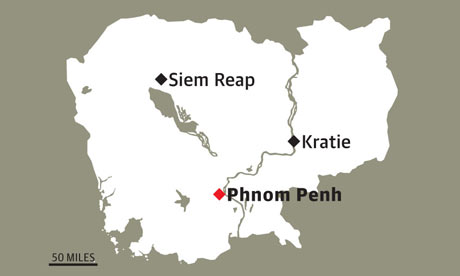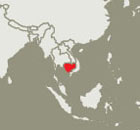Facts and statistics on Cambodia including history, population, politics, geography, economy, religion and climate
- The Guardian,
- Monday 20 April 2009
- Article history

Map of Cambodia. Source: Graphic
Potted history of the country: The Khmer empire stretched over south-east Asia from the 9th to the 15th century. Over the next four centuries, it was variously under Thai or Vietnamese rule, with short periods of independence in between. It became a French protectorate in 1863, and part of French Indochina in 1887, before gaining independence in 1953. After a five-year civil war, the Khmer Rouge, led by Pol Pot, won power and evacuated the cities, sending the population to work in the countryside. An estimated 1.7 million Cambodians died in Pol Pot's "killing fields". Peace was finally re-established in 1991, with the United Nations given a mandate to enforce the ceasefire.
- At a glance
- Location: Indo-Chinese peninsula
- Neighbours: Laos, Thailand, Vietnam
- Size: 69,898 square miles
- Population: 14,655,950 (65th)
- Density: 209.7 people per square mile
- Capital city: Phnom Penh (population 1,466,000)
- Head of state: King Norodum Sihamoni
Head of government: Prime minister Hun Sen - Currency: Riel
- Time zone: Cambodian standard time (+7 hours)
- International dialling code: +855
- Website: cambodia.gov.kh
- Data correct on Monday 20 April 2009
Political pressure points: The prime minister, Hun Sen, has been in office since 1985. No stranger to controversy, the former Khmer Rouge cadre seized power from his co-prime minister, Prince Ranariddh, in a coup that brought renewed fighting. His increasing authoritarianism and corrupt capitalism has led to street clashes over sales of prime land to overseas investors.
Population mix: Khmer 95%; other 5% (Chinese, Vietnamese, Cham and smaller ethnic groups)
Religious makeup: Buddhist 93%, Muslim 3%, Christian 2%
Main languages: Khmer, Vietnamese, Chinese
Living national icons: Chhim Sothy (artist), Preap Sovath (singer), Eh Phoutong (kickboxer)
Landscape and climate: Cambodia has a long Gulf of Thailand coastline. Inland, its major features are the Tonlé Sap - the largest freshwater lake in south-east Asia - which expands and shrinks dramatically each year, and the Mekong river, which flows 300 miles through the country. Most Cambodians live along the rich alluvial plains flooded during the monsoon between May and October.
Highest point: Phnum Aora,l 1,810 metres
Area covered by water: 1,745 square miles
Healthcare and disease: One of the world's poorest countries, although its rate of HIV/Aids infection has improved in recent years. The risks from dengue fever, malaria and Japanese encephalitis are extremely high, along with waterborne diseases such as hepatitis A and typhoid. Many Cambodian children suffer from malnutrition.
Average life expectancy: 56/61
Average number of children per mother: 3.3
Maternal deaths per 100,000 live births: 540
Infant deaths per 1,000 births: 82
Adults HIV/Aids rate: 1.3%
Doctors per 1,000 head of population: 0.2
Adult literacy rate: 76.3% (m 85.8%/f 67.7%)
Economic outlook: Dependent on garment exports, booming tourism and foreign investment for construction, it is destined for a sharp slowdown. Estimates suggest GDP may grow just 1% this year, down from about 7%.
Main industries: Plywood, electric energy, cigarettes
Key crops/livestock: Rice, manioc, maize, sugar cane, banana, pigs, cattle, buffaloes
Key exports: Rubber, clothing, rice
GDP: £3,707m (119th)
GDP per head: £261
Unemployment rate: 7.1%
Proportion of global carbon emissions: 0.01%
Most popular tourist attractions: Temples of Angkor Wat, and the ruins of the ancient capital Koh Ker.
Local recommendation: Beng Mealea a 12th-century temple built to the same design as Angkor Wat. It is 50 miles north of the original complex, but a world away from the hordes of tourists thronging its famous cousin.
Traditional dish: Amok (curry, usually made with fish, containing coconut milk and turmeric)
Foreign tourist visitors per year: 1,421,615
Media freedom index: 126
Did you know ... Before ascending the throne, King Sihamoni was a classical dance instructor.
National anthem:
Temples are asleep in the forest
Remembering the splendour of Moha Nokor
Like a rock, the Khmer race is eternal.
· Information correct on date of first publication, Monday 20 April 2009.


No comments:
Post a Comment